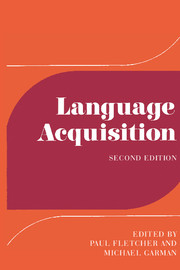Book contents
- Frontmatter
- Contents
- Contributors
- Preface
- Part I Contexts and determinants
- Part II The development of linguistic systems: phonology
- Part III The development of linguistic systems: grammar
- Introduction
- 13 Early vocabulary
- 14 Early syntax
- 15 Assessing morphological development
- 16 Personal pronouns
- 17 Tense and aspect
- 18 Modality
- 19 Deixis
- 20 A crosslinguistic perspective: morphology and syntax
- Part IV Later language development
- Notes to chapters
- Bibliography and citation index
- General index
- Titles in the series
20 - A crosslinguistic perspective: morphology and syntax
Published online by Cambridge University Press: 05 June 2012
- Frontmatter
- Contents
- Contributors
- Preface
- Part I Contexts and determinants
- Part II The development of linguistic systems: phonology
- Part III The development of linguistic systems: grammar
- Introduction
- 13 Early vocabulary
- 14 Early syntax
- 15 Assessing morphological development
- 16 Personal pronouns
- 17 Tense and aspect
- 18 Modality
- 19 Deixis
- 20 A crosslinguistic perspective: morphology and syntax
- Part IV Later language development
- Notes to chapters
- Bibliography and citation index
- General index
- Titles in the series
Summary
Introduction
Crosslinguistic research in child language has been motivated by the following kinds of questions. Universality – which aspects of language development emerge as universal, by contrast with those which are constrained by the forms or content of the particular language that is learned? Linguistic specificity – if such commonality is revealed, can it be attributed to more general cognitive underpinnings, or is it a function of uniquely linguistic knowledge? Relative difficulty – across languages, what aspects of linguistic structure and of the relationship between forms and content pose special difficulties for the learner, and how can these be predicted and explained? Acquisitional principles – what underlying strategies can be detected across children learning different languages, in the shape of such procedures as the drive towards one-to-one mappings between form and meaning or the use of over-regularization?
Two main approaches have been adopted by studies which address such questions on the basis of data from children learning a variety of mother tongues. One approach is to cull data from a range of studies dealing with different languages, and often differing in aim as well as method, in order to reach generalizations about broader, more universal properties of child language development. An early model which evolved out of this type of study is found in Roman Jakobson's claim of an initial universal phonetic inventory underlying a universal ordering of development in phonemic contrasts (Jakobson 1968).
Information
- Type
- Chapter
- Information
- Language AcquisitionStudies in First Language Development, pp. 429 - 448Publisher: Cambridge University PressPrint publication year: 1986
Accessibility standard: Unknown
Why this information is here
This section outlines the accessibility features of this content - including support for screen readers, full keyboard navigation and high-contrast display options. This may not be relevant for you.Accessibility Information
- 23
- Cited by
